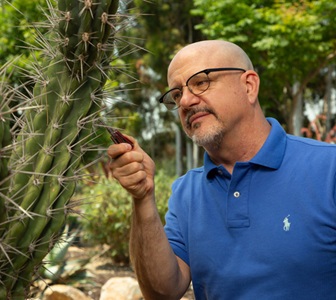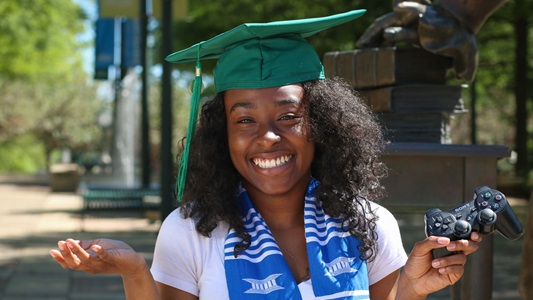The prickly cactus plant sparked an idea to fine-tune high-tech avionics for one of the most advanced aircraft in the sky.
The Tale of AI, Alligators and a Shark
For Jessica Ascough creating autonomous vehicles equipped with AI is more than a pet project.

By Suzanne Kubler
A sign on the edge of Jessica Ascough’s property in Brevard County, Florida, reads “WARNING: Entering THE SWAMP.” The systems engineering chief scientist shares her 2.5 acres of undeveloped swampland with wild hogs, turkey, deer, snakes, alligators and more. The property is perfect for Jessica’s pet project: creating a full-scale team of land, air and sea autonomous vehicles equipped with artificial intelligence (AI).
Live Wires to AI
Jessica is a life-long trailblazer. She started her career as the first female journeyman lineman in the United States, where she free-climbed power poles, worked with live voltage and constructed electrical power lines. In 1979, she participated in a hurricane electricity restoration trip in Melbourne, Florida. It was then she came up with her plan to become an engineer and make Melbourne her future home.
“When I drove my bucket truck through downtown Melbourne, the old town warmth and charm was so welcoming,” said Jessica. “I thought what a peaceful, friendly place this would be to live.”
Jessica attended college at night for eight years to make her dream, a reality. She graduated with her bachelor’s degree in computer science in 1994 and moved to Melbourne. She has since earned two master’s degrees, one in systems engineering management and another in predictive analytics. She then purchased the perfect piece of property for her research.
The Vision
Picture toy trucks driving across the untouched terrain, child- sized boats skimming across the swamp and plastic airplanes flying through the sky above Jessica’s property, each equipped with its own machine-learning circuitry.
“The vehicles will develop individual ‘personalities’ over time — the vehicle in the swamp with the gators will experience different things than the one up in the air with the birds,” said Jessica. “And eventually one of the vehicles will become the leader.”
The lead AI vehicle will take data from the entire team — including the predator’s last known coordinates, its predicted path and threat level — to determine the likelihood that danger is nearby. Jessica said her AI team will initially work as a public service to verbally warn passersby when alligators or snakes are close, as they patrol the area using their multiple sensory inputs.
Patent Preps
Jessica said she hopes she can use her AI research at work as she develops AI strategy at home. She’d eventually like to see AI sensors used in a similar way to warn warfighters of lurking hazards. For Jessica, the mission is everything.
“I’m from an Air Force family and want to honor that legacy. My grandfather served in the military, and he’s my hero,” said Jessica, whose father also served. “He came to this country alone without a penny in his pocket. He enlisted during World War I. His words of wisdom were to never look back; always look forward.”
Jessica has taken her grandfather’s advice to heart and looks to help future generations with her AI patents. So far, she has six.
“I think it’s important to file patents so you can build on prior research and take it a step forward,” said Jessica. “That’s how you move intellectually and technically ahead — by being able to build on the shoulders of giants.”
Jessica wants to encourage others to create and invent as well. She’s part of a team that recently stood up the Systems Engineering ‘Shark Cage’ pilot program, a Northrop Grumman employee competition to help increase the number of invention submissions.
Jessica said pushing the boundaries of possible with her AI patents is also about keeping ethics the top priority and making sure AI is always used as a trust- but-verify resource. She believes AI has the potential to offer big benefits to humans.
“As long as people like me and others at Northrop Grumman are looking ahead at potential risks and solving problems with AI before they happen, we will continue to safely and effectively uncover new possibilities,” said Jessica. “Making life better for everyone with AI — that’s what’s important.”
Life at Northrop Grumman
Your work at Northrop Grumman makes a difference. Whether you want to design next-generation aircraft, harness digital technologies or build spacecraft that will return humanity to the moon, you’ll contribute to technology that’s transforming the world. Check out our career opportunities to see how you can help define possible.


